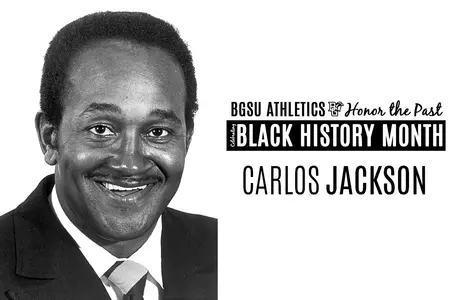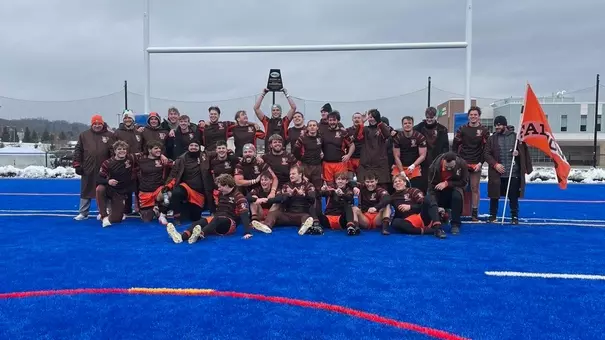Bowling Green State University Athletics

BG Athletics Celebrates Black History Month: Carlos Jackson
January 31, 2016 | Football, General, Hall of Fame, Heritage Sports
Throughout the month of February, BGSUFalcons.com will be highlighting some of the African-Americans who have impacted the University, the community and the athletics department. From pioneers to more recent members of the department, Matt Markey will be providing the stories of our history. Kicking off the month is a feature story on Carlos Jackson, one of the first African-American coaches at BGSU.
As a footnote, the Green Bay Packers recently discovered, as revealed in this story (CLICK HERE for link), that Walter Jean may have broken the color barrier for the Packers. As noted in the story from the Packers, Jean was head coach of Bowling Green in 1920, the second year of the program's existence.
In his days as a player with the Bowling Green football team, and then as a coach with the Falcons, Carlos Jackson epitomized strength – the strength of his will, his determination, and his character.
He was an all-conference halfback who helped the Falcons to a 7-1-1 record in the 1955 season, their first under legendary head coach Doyt Perry. Jackson averaged 5.8 yards per carry that year, had 134 yards rushing in a 39-0 rout of rival Toledo, and was chosen as the season MVP by his teammates.
After being stricken with polio, Jackson missed all of the 1956 season, but he battled his way back and played in a limited role the following year. Following graduation and a stint as a high school coach, Jackson returned to Bowling Green as an assistant coach under Don Nehlen.
Jackson's daughter Connie Jackson Grieger recalled that as one of the earliest African-American college football coaches, her father knew his every move could be scrutinized, but he never wavered despite that added pressure.
"There was a prevailing umbrella of color at the time, and as an African-American so many years ago, you weren't allowed to do what you wanted to do. You had to maintain an air of perfection, and any mistake was looked on negatively for your race," she said.
Jackson excelled at BG, spending seven years as offensive coordinator under coach Nehlen, and etching his legacy into the Falcons' lore.
"My father was a very spiritual man, and I think that guided him and made him strong. I think for the people who were here at the time and witnessed it, his role was extremely important. He was a huge role model for African-American kids, and aside from his involvement with them in athletics, he was really connected with guiding young people's lives."
Carlos Jackson died of a heart attack in 1974, at just 44 years of age. He was loved by his players and highly respected by his colleagues, and in his honor the university created the Carlos Jackson Memorial Award, which annually goes to the player who best exemplifies what Jackson stood for -- "leadership, inspiration and extra effort."
"It's overwhelming to think of what he went through with the polio and the other challenges he faced, but he always said to not let the issues affect you," Jackson's daughter recalled. "That was the gift of my father -- he just didn't talk the talk – when he spoke it, his words meant something."
Jackson, who was also a member of the Falcon track team during his time as a student, was inducted into the BGSU Athletic Hall of Fame in 1977.
As a footnote, the Green Bay Packers recently discovered, as revealed in this story (CLICK HERE for link), that Walter Jean may have broken the color barrier for the Packers. As noted in the story from the Packers, Jean was head coach of Bowling Green in 1920, the second year of the program's existence.
In his days as a player with the Bowling Green football team, and then as a coach with the Falcons, Carlos Jackson epitomized strength – the strength of his will, his determination, and his character.
He was an all-conference halfback who helped the Falcons to a 7-1-1 record in the 1955 season, their first under legendary head coach Doyt Perry. Jackson averaged 5.8 yards per carry that year, had 134 yards rushing in a 39-0 rout of rival Toledo, and was chosen as the season MVP by his teammates.
After being stricken with polio, Jackson missed all of the 1956 season, but he battled his way back and played in a limited role the following year. Following graduation and a stint as a high school coach, Jackson returned to Bowling Green as an assistant coach under Don Nehlen.
Jackson's daughter Connie Jackson Grieger recalled that as one of the earliest African-American college football coaches, her father knew his every move could be scrutinized, but he never wavered despite that added pressure.
"There was a prevailing umbrella of color at the time, and as an African-American so many years ago, you weren't allowed to do what you wanted to do. You had to maintain an air of perfection, and any mistake was looked on negatively for your race," she said.
Jackson excelled at BG, spending seven years as offensive coordinator under coach Nehlen, and etching his legacy into the Falcons' lore.
"My father was a very spiritual man, and I think that guided him and made him strong. I think for the people who were here at the time and witnessed it, his role was extremely important. He was a huge role model for African-American kids, and aside from his involvement with them in athletics, he was really connected with guiding young people's lives."
Carlos Jackson died of a heart attack in 1974, at just 44 years of age. He was loved by his players and highly respected by his colleagues, and in his honor the university created the Carlos Jackson Memorial Award, which annually goes to the player who best exemplifies what Jackson stood for -- "leadership, inspiration and extra effort."
"It's overwhelming to think of what he went through with the polio and the other challenges he faced, but he always said to not let the issues affect you," Jackson's daughter recalled. "That was the gift of my father -- he just didn't talk the talk – when he spoke it, his words meant something."
Jackson, who was also a member of the Falcon track team during his time as a student, was inducted into the BGSU Athletic Hall of Fame in 1977.
BG MBB : Postgame Interviews 12.22
Monday, December 22
BG WBB : Postgame Interviews 12.20
Sunday, December 21
BG MBB : Postgame Interviews 12.16
Wednesday, December 17
BG WBB : Postgame Interviews 12.16
Tuesday, December 16




